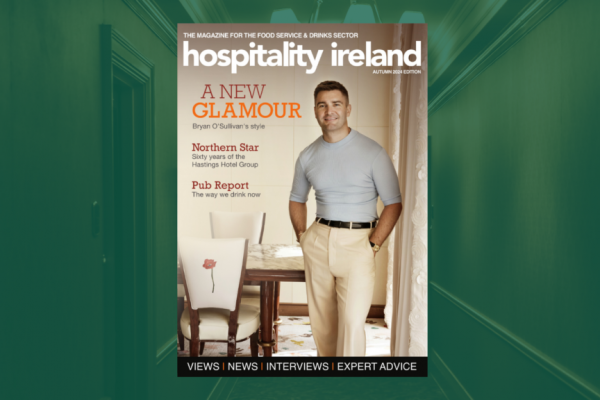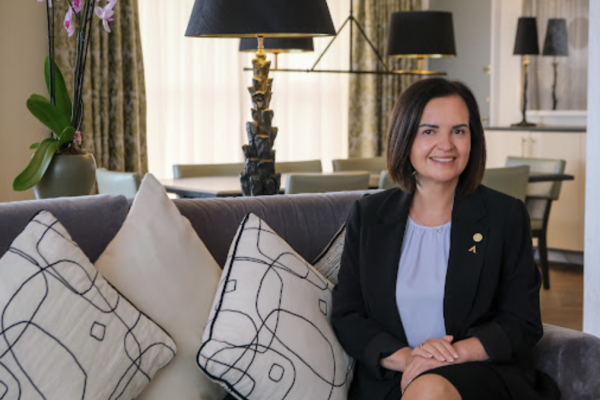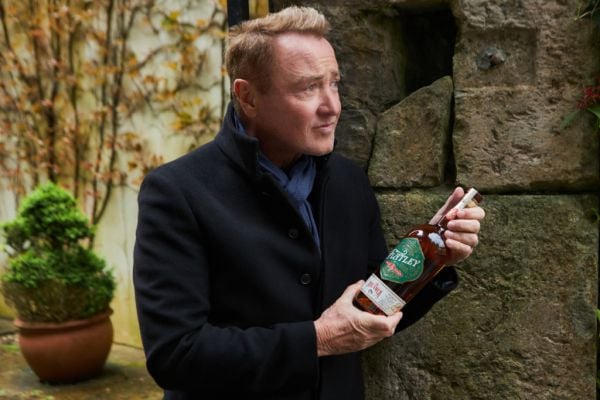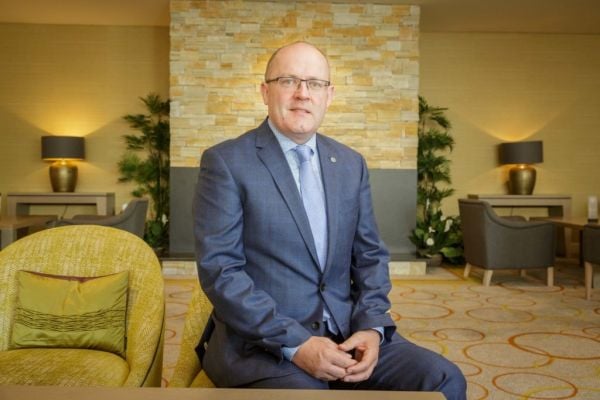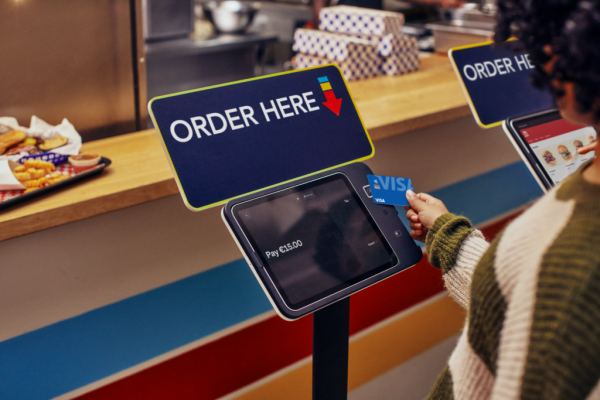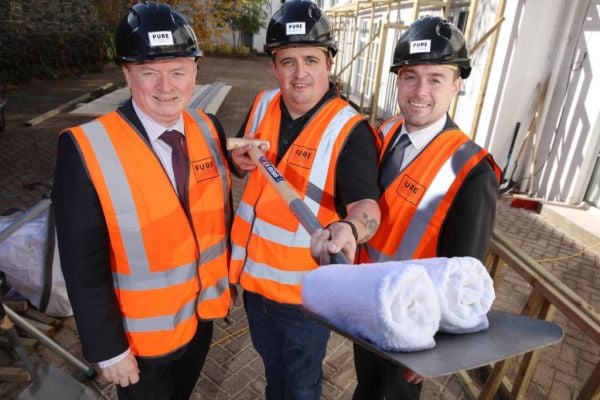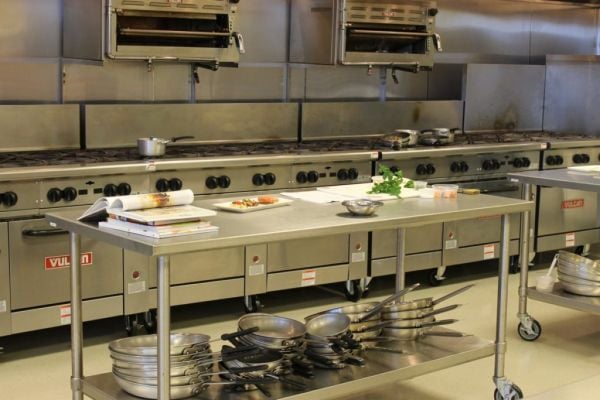Emily Hourican catches up with Colin Kelly, head chef of the Twenty-Two, a ‘hotel and cultural space dedicated to the art of lingering’, in West London.
This article was originally published in the Winter 2022 issue of Hospitality Ireland Magazine, in December of 2022.
I’m the head chef of the Twenty-Two. It’s the first time I’ve really worked somewhere senior in a hotel situation. I’ve had a lot of time to prepare for this. Myself and Alan Christie used to be business partners at Picture. We work really tightly, trying to build foundations, to set the hotel up systematically, for us to step back, bit by bit.
We’re doing lots of hours now, but, slowly but surely, we can see it all taking shape. We’re trying to set the example, right from the top to the bottom. Whether it’s a club sandwich or a VIP party in the members’ club – everything is approached with the same urgency. When the order comes on, I don’t want everyone just to shun away from it. I want everyone to approach it.
Make sure that’s the best bowl of fries you’re going to serve – that if you got them, you would be happy to receive them. That’s this mentality we’re trying to set: care, but really care. Because if you really care, you’re gonna make that sandwich as fast as you can with the best, crunchiest toast. I know it sounds a bit pedantic, but if you build with this culture, then it becomes second nature.
If we can do the simple things, the culture of responsibility will just run through the place. We have expectations of all the team, and our minimum requirement is we all work professionally. We all have respect for each other. When we come to work, we come to work hard. It’s not like the military, like it used to be. The atmosphere in the kitchen isn’t solely down to me – everyone is responsible.
We have a very strong team in numbers and capabilities, and we have to keep them, but we have to build them. It’s like the fine balance with not making it too military, but making it professional enough that the chefs who want to be professional are staying professional, and that we’re keeping the guys who want to progress in their career.
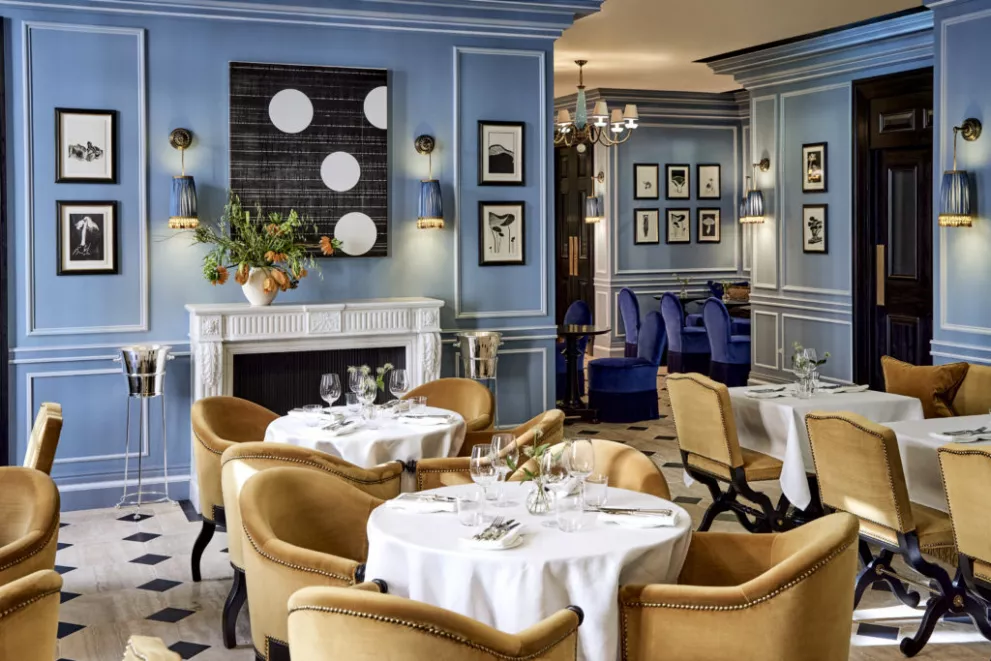
TEAMWORK
In a hotel, it’s different in a restaurant, in that it’s 24/7, 365 days a year, and we need cooks and chefs of all stages and skill levels because not everybody wants to be gunning to the top, and there are those guys who just want to come in and do their jobs.
We’re trying to get this balance between keeping the chefs who want to learn and giving them more all the time, and their careers are growing, and they’re taking more and more responsibility, bit by bit. We let them settle in. We’re trying to build menus and systems that the kitchen can manage, that we’re still proud of the food we cook and serve, but it can’t be military, and it can’t be good enough on a quiet Monday lunch, but not sustainable and manageable on a Saturday night, when we’ve got 200 booked.
Every dish that you prepare or think of for the menu, you have to go through, step by step, and then think about how we can be so organised that we eliminate as much risk of it going wrong. How will the guys manage this on a Saturday night? When all the tickets are coming in, how can we make sure they make the correct decisions?
You’re getting low on stuff, or what you have isn’t to the quality required. Now it’s crunch time, and you make a decision to put it on the plate or not – or you don’t tell the chef, and you try to serve it. The chef spots it, or worse: it goes to the restaurant, and the customer complains. We portion-control everything. We try to organise it so that everything in your fridge is 100% servable, and now we have these services that are controlled without chaos, without stress.
Service gets busy, but it never worries me because we’ve controlled it. We’ve set the chefs up in such a way that we can’t fail, and there’s a confidence that goes around the kitchen. I’m not talking about an arrogance, when you lose complacency and you switch off – we still have to manage the focus.
We’re trying to mind the staff, so we’ll have them for years, rather than one year, because there’s nothing worse than investing in three, four or six months. You can’t make progress, particularly now, when staff are hard to come by. This is why we’re so lucky and grateful for the staffing levels we have at the hotel, and now we have a situation where we’re rotating staff around sections and kitchens and becoming stronger because of it.
I don’t have to cook in Michelin-star restaurants to be in good food now. When I was a kid coming through, I was like, if I’m going to be the head chef I want to be, I have to learn everything through the very best ways, whereas nowadays, I’m not sure it’s necessary.

MENTAL HEALTH
Look after your health and mental health. You can’t work those hours for years and years without suffering the consequences, but it’s also very good for the consumer because the world is full of people who want to eat really good food, but they don’t want to go through the Michelin three-star. They want really good food, but they want it to be in a really casual environment, and they want to feel that the people who are working in the kitchens and who are serving them also are happy.
One of the main reasons we keep the chefs at 45 hours a week is to make sure, when they work, they’re in their peak performance because there’s a false economy in thinking that the more hours you work, the more work you do. I don’t want our team to be anxious about work. Work doesn’t tire me out. It doesn’t consume my days off. If work is good, then outside of work is good – life is good.
I’m very lucky. I’ve got two great kids and an amazing partner. My time off is just with my family. When I’m with the kids, I’m not on my phone, worrying about work. I need to be present with them because this gives me the fuel to go back to work happy. I try to instil this, and this is one thing I’ve changed with myself: to try and be more positive, to try and be more grateful for the life I have.
When I got my first head chef job – at Wild Honey [in Lisdoonvarna, Co. Clare] – six months into that, we got a Michelin star. From early on, I struggled with the management of the team, but I just couldn’t fix it. These guys are working so hard, but I was so worried and nervous about losing the star and maintaining standards that I couldn’t give them an inch. The only thing is that, for the seven years that I stayed there, we maintained the Michelin star under the extreme low levels of staff, and under pressure and against the odds. Looking back now, I wish I managed it differently.
The place had to be spotless. We weren’t allowed to make mistakes. We weren’t allowed to talk because talking equals destruction. Destruction equals mistakes. We never even celebrated getting a Michelin star – this incredible achievement. I’m only 27 years old. I’ve only been a head chef for six months, and we’ve got this surprise Michelin star.
For seven years, I’m not sure I even enjoyed working. The food we cooked was lovely and, looking back now, the stuff I learned, cooking wise, was great. Working with Anthony [Demetre] was amazing, but I don’t really look back at that time fondly. I couldn’t have worked any harder. I couldn’t have cooked any better, but I would have. I wish I was 10% less at those things and 20% better at managing people, or even 50%.
This has been my drive: to be a better manager – to make people want to work for you, to inspire people, to teach people. You see someone doing something wrong. Rather than making a big deal of it, go over and quietly show them how to do it. When I do that now, the reaction is incredible.
There are always a million things going on, but if we all get ready for service, then we can relax a little bit and have a chat. Until then, let’s just stay focused and be the best we can be. That’s the example I tried to set.
I say to them, “Just be 1% better than yesterday,” and that doesn’t necessarily mean a better cook – it might be how you’ve worked, how you’ve applied yourselves, how you’ve created your meals, how you’ve done your ordering. Every day is progress, and most people won’t become 1% better unless they want to.

STARTING OUT
None of my friends were chefs. We always ate well at home, but it wasn’t like I was popping peas on my granny’s lap when I was a kid. It wasn’t that romantic – it wasn’t trips to South of France or anything like that that triggered it.
I wanted to be in the Navy or the Army – I’m colour-blind, so I can’t be. Then one day my dad said, “What are you gonna do? You’re almost 16,” and I was like, “I’m going to be a chef.” There’s a local hotel. I said, “I’m going to go and ask them for a job.”
I said to the head chef, “I’m looking for a job. I want to be a chef. I just want to work weekends,” and he’s like, “Well, I can’t justify paying you because we’ve got more experience.” “Well, I’ll do it for free at the weekend.” I used work Saturday nights and all day Sunday, not doing much at the start, slowly growing, but I was super-keen and always trying to keep busy.
I went back, and eventually they gave me a job in summer – like £2 an hour – five days a week. Then I went to Athlone IT, and it was when I realised I really loved cooking because everything was sticking in my brain. The first exam we did, I got 87%, but I didn’t study, and the lecturer was like, “How did you get 87%?” I was like, “It was just in my brain. I was able to listen to you. I was focused. I could concentrate. It wasn’t like I was losing concentration – everything was so interesting.” In school, I didn’t apply myself very well. It was the first time I didn’t really have to try. I remember going on my first placement and my second placement, and then I was like, is this is it?
I worked in a place called K.C. Blake’s on Quay Street – a very busy place, where the chef was super-disciplined. His food was quite casual – he didn’t want highend stuff – but he really took me under his wing. I think I was very lucky in all the restaurants I worked in. The head chef took me under his wing, or the senior chef took me under his wing. I was super-keen.
I was quite humble. When I made a mistake, I was like, I got to work harder. I didn’t really need to be given out to to know if I had a bad night or good night, but I was very lucky with the care I was given. After K.C. Blake’s, I went to l’Ecrivain – and, again, it was like another step up, but this time it was like League of Ireland to the Premier League. L’Ecrivain was incredible. The food looked so good. Again, I was really well looked after. I loved it there. I wish I could have had the love I had there for the rest of my life in cooking, and the hours were good – there was a nice kind of social side to it.
Working with Derry and Sallyanne [Clarke], I learned about genuine hospitality, not about what was just on the plate. It was prime ingredients, it was top cooking, but also how they made people feel. I look at them and another Irish chef, Richard Corrigan, as the blueprint for genuine warmth and hospitality, where the welcome was like, welcome into my house – like this is a fancy restaurant, but you’re not intimidated. This is the key for service.
I’ve been to lots of restaurants that make me feel that way, too, but I’ve been to lots of pretentious places that make me feel the opposite, but these guys nailed it because the place was heaven for lunch and dinner every day.

LONDON
My next step was London. It was another step up from l’Ecrivain, but coming from such a very good situation to the absolute opposite – there was no one who took me under their wing. I hadn’t prepared myself. It wasn’t as much money. I was living in not such a good flat. The hours were horrendous, away from my family, and it was really tough.
I was a young, innocent chef, and I needed to take a step up somewhere else – maybe going somewhere else and learning foundation cooking. I went to a place called Orrery, on Marylebone High Street, and it was super-disciplined, supertechnical – quite traditional, with some modern techniques, but it was completely out of my comfort zone. I had to work so hard just to keep up – the level was so high. Every other chef was miles ahead of me, and it was hard, confidence wise, but I stuck at it.
After a year, I moved to work with Anthony Demetre, who had a restaurant. His approach was quite modern – his cooking was excellent. He was the best chef I’ve ever worked for and named one of the best chefs in the UK. His cooking ability is incredible. Every section, he could do it, and this is the example that I’m trying to set.
He kind of took me under his wing, and because I was a humble guy, when I did wrong, I knew I did wrong, but I never got distracted too much in the kitchen – I just listened to him. I wanted to be more like him all the time. I was always like, I’m not here to make friends – I’m here to progress and to be as good as this guy.
He gave me my first head chef job. Mentally, it was very hard to work for him because he was so good, you never felt good enough – no pats on the back, very few high-fives. You always felt a little insecure around him, and he didn’t spend a lot of time in the kitchen, but when he did, it was a bit awkward because he’d be chatting to the guys, and everyone was like, oh, Anthony is such a nice guy, and his mentality was calling, “You’re responsible. If these guys are making mistakes, you’re still responsible. You’re the head chef,” so I did learn lots from that.
We opened Picture after that: Picture Marylebone and Picture Fitzrovia. We had those for six years, and that was amazing because that’s when I started to change my management style because it was my restaurant. I started to organise things better and teach and watch guys become better under me. It was so rewarding.
I’m getting great reviews, but watching these guys become stronger and more confident in the kitchen and stepping back and giving them more responsibility fulfils me more than the cooking. Even though I love cooking more than I love managing, this is more rewarding because managing people is so hard.
Unfortunately, we had to close the restaurants. Business wasn’t strong enough. It felt irresponsible to our families to continue because I’ve got two kids and an amazing partner. I’m working very hard, but I’m not bringing home a lot of money, and we’re not financially securing our futures with our restaurants, so we made the decision to close them and find jobs that would help us financially secure our futures for our family. It’s a bit of a no-brainer.
What I’ve learned since leaving Picture, cooking wise and managing wise, is huge. I’m very humbled by it. That wasn’t the ceiling. I went away and I worked with Richard Corrigan for a few months, learning so much about genuine hospitality from him, and being generous.
The hospitality industry is really, really hard. The resources are so low, and what I mean by that is not just staffing levels, but the bottom line. The percentages are so low, making money is so hard, and then you’ve gotta really make hay when the sun shines. Then you exhaust your resources so much it can backfire on you, but one thing I learned from him [Corrigan] was, if you stick to the basics of genuine warmth and hospitality, you won’t go far wrong. I’ve seen him treat people like he was their private chef for the night.
I saw this guy work. I watched this guy talking to people, making people enthusiastic about being in his restaurant, being kind to people. It was really incredible, and I learned so much from it. His knowledge of food was incredible as well. When you look at Richard, he’s so bubbly. He’s so charismatic.
He drives his staff. The minimum requirement is absolute hard work and dedication in his restaurants, but he genuinely cares for his team. He’ll look after you if you need something. I’m not just talking about a point-at-the-end-of-service side. If you or your family were in trouble, he really looked after you. He really cared. He’s an amazing guy. He’s just opened [the Park Café] in Dublin.
THE TWENTY-TWO AT A GLANCE
How many dining rooms?
We have the public restaurant on the ground floor which serves breakfast (Monday to Friday), lunch and dinner 7 days a week. We have a Private dining room that can hold up to 25. We have a members restaurant that is open Wednesday to Saturday for dinner only. We can also cater for events and canapé parties.
How many covers (for lunch and dinner)? The ground floor restaurant that is open to the public does 40-50 for breakfast, up to 70 for lunch and between 150 and 200 for dinner. The members restaurant does up to 100 covers for dinner.
Number of staff - front and back of house? 190
Percentage breakdown between food & beverage? 60:40
Signature dishes:
- Portobello mushrooms, grilled polenta, slow cooked kale
- Devonshire crab salad, cucumber, dill, radish
- Fried duck egg, smoked duck, white truffle toastie
Read More: Hospitality Ireland Winter 2022: Read The Latest Issue Online!

